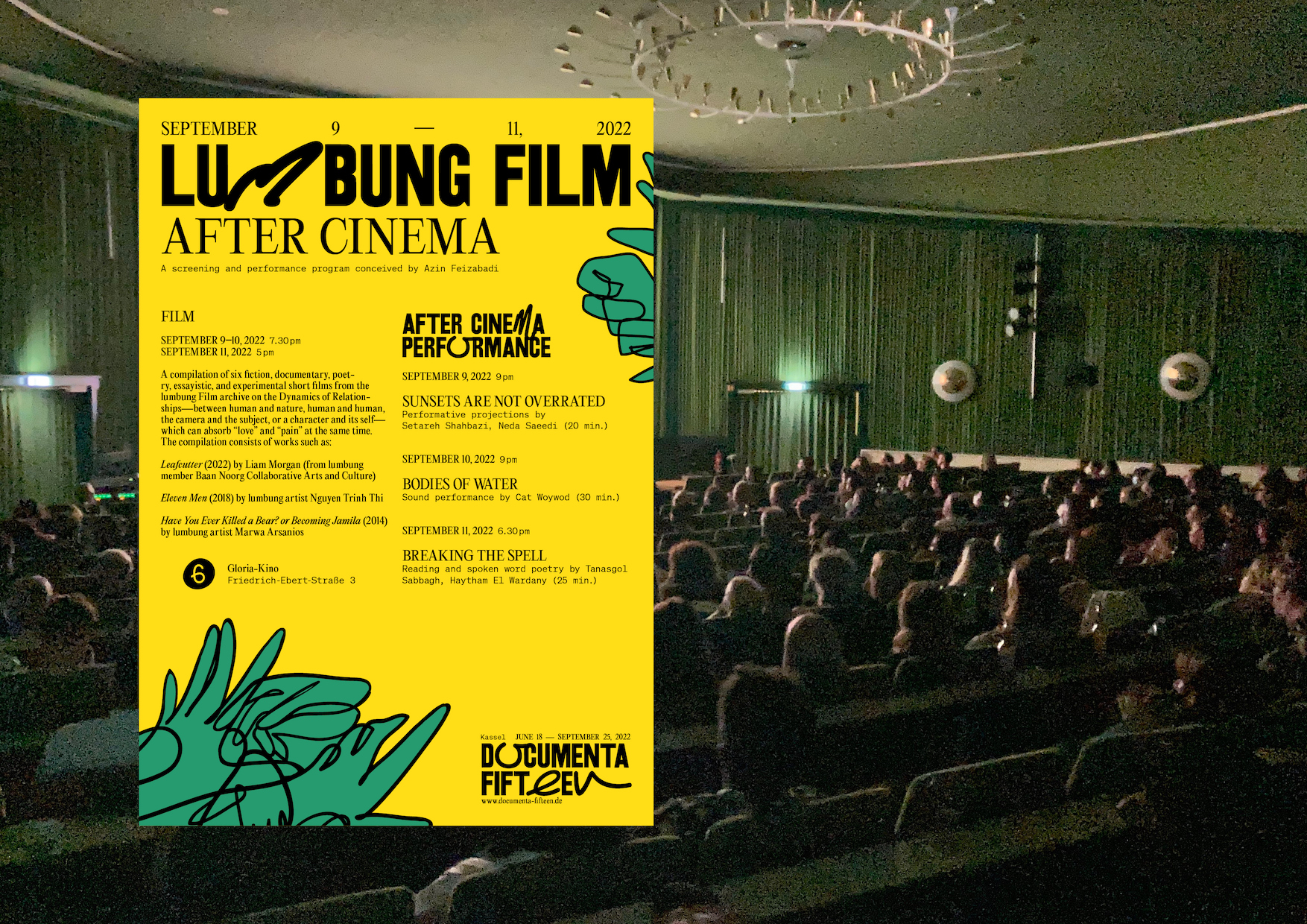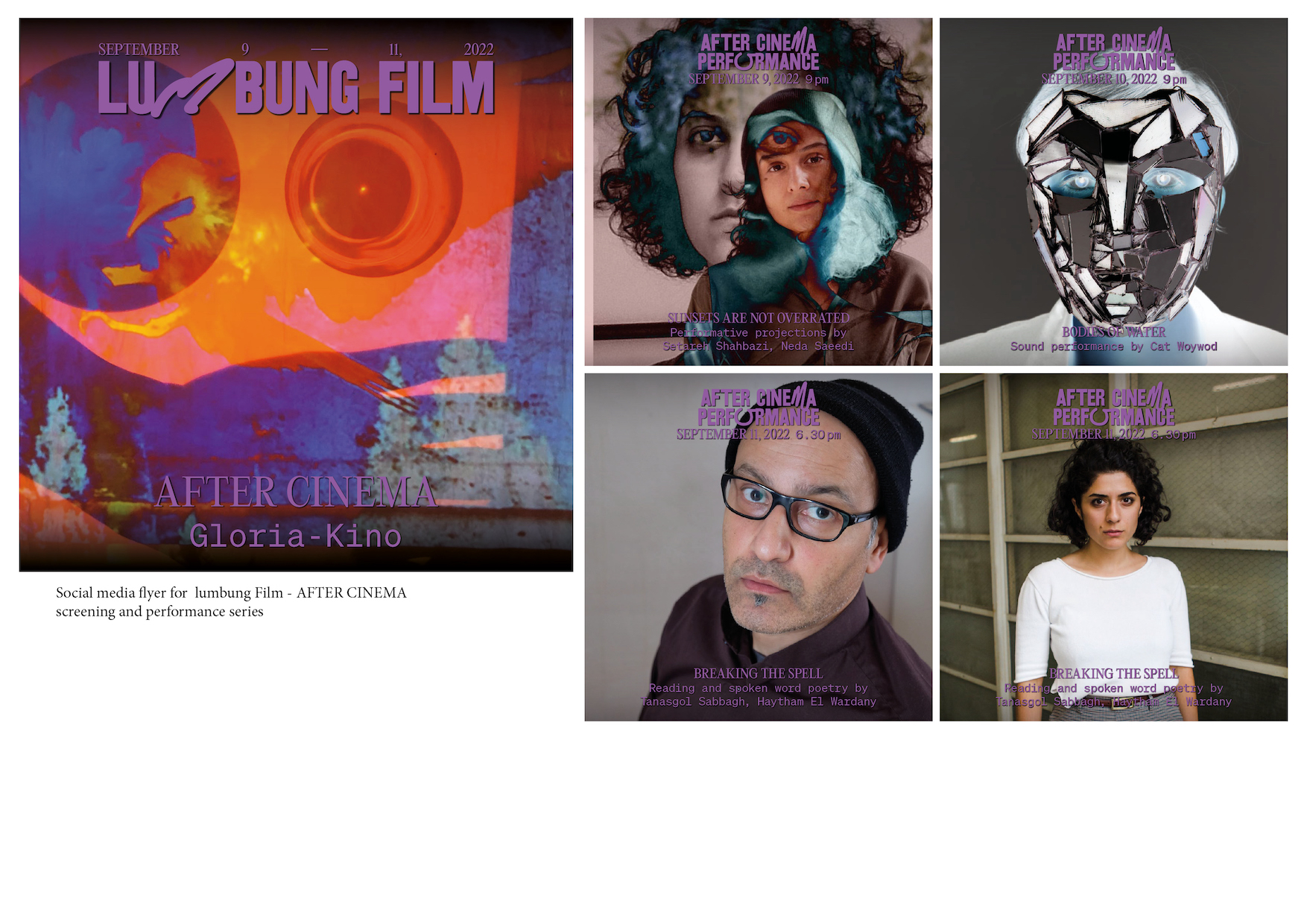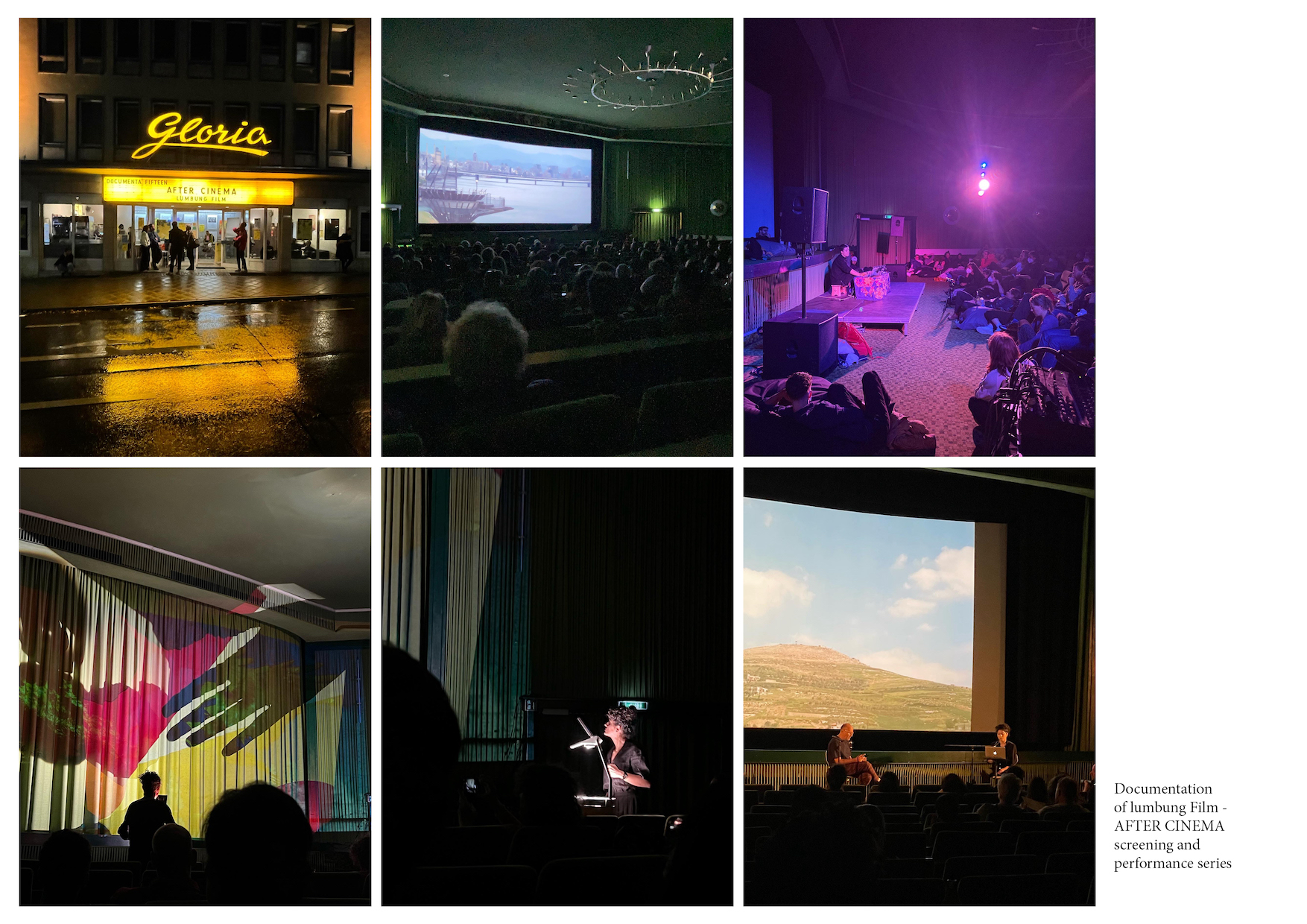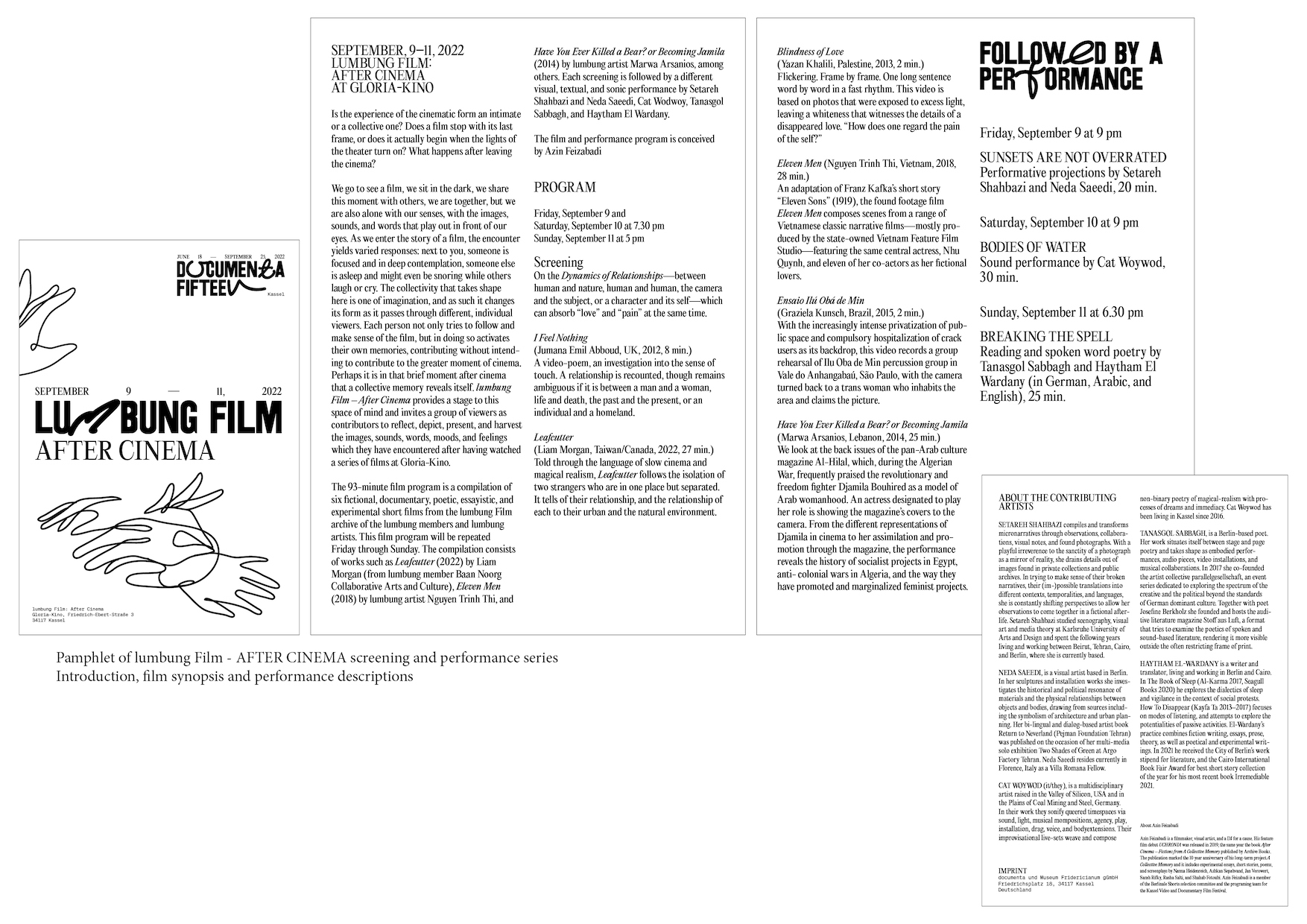lumbung Film: AFTER CINEMA #1, #2 & #3
A screening and perfomance program on the occasion of
lumbung Film documenta fifteen
09th - 11th September, 2023
Gloria Kino, Kassel
Conceived by Azin Feizabadi
Is the experience of the cinematic form an intimate or a collective one? Does a film stop with its last frame, or does it actually begin when the lights of the theater turn on? This event series provides a stage to encounter these questions on site and invites a group of writers, visual and sonic artists to perform, reflect, depict, present, and harvest the images, sounds, words, and moods which they have encountered after having watched a compilation of films from the lumbung Film archive.
A screening and perfomance program on the occasion of
lumbung Film documenta fifteen
09th - 11th September, 2023
Gloria Kino, Kassel
Conceived by Azin Feizabadi
Is the experience of the cinematic form an intimate or a collective one? Does a film stop with its last frame, or does it actually begin when the lights of the theater turn on? This event series provides a stage to encounter these questions on site and invites a group of writers, visual and sonic artists to perform, reflect, depict, present, and harvest the images, sounds, words, and moods which they have encountered after having watched a compilation of films from the lumbung Film archive.
The 93-minute film program includes six fictional, documentary, poetic, essayistic, and experimental short films from the lumbung Film archive. The focus is on the extent to which going to the cinema is a collective experience and what happens after leaving the cinema.
Following the screening (the program will be repeated Friday through Sunday), varying performances by Setareh Shahbazi and Neda Saeedi (visual artists), Cat Woywod (sound and improvisation artist), Tanasgol Sabbagh (poet and spoken word performer), and Haytham El Wardany (writer) will be presented in response to this question.
THE FILMS
A compilation of fiction, poetry, essayistic, and experimental short films on the Dynamics of Relationships—between human and nature, human and human, the camera and the subject, or a character and its self—which can absorb “love” and “pain” at the same time.
I feel nothing
(8 min., by Jumana Emil Abboud, UK, 2012)
A video-poem, an investigation into the sense of touch. A relationship is recounted, though remains ambiguous if it is between a man and a woman, life and death, the past and the present, or an individual and a homeland.
Leafcutter
(27 min., by Liam Morgan, Taiwan/Canada, 2022)
Told through the language of slow cinema and magical realism, Leafcutter follows the isolation of two strangers who are in one place but separated. It tells of their relationship, and the relationship of each to their urban and the natural environment.
Blindness of Love
(2 min., by Yazan Khalili, Palestine, 2013)
Flickering. Frame by frame. One long sentence word by word in a fast rhythm. This video is based on photos that were exposed to excess light, leaving a whiteness that witnesses the details of a disappeared love. “How does one regard the pain of the self?”
Eleven Men
(28 min., by Nguyen Trinh Thi, Vietnam, 2018)
An adaptation of Franz Kafka’s short story “Eleven Sons” (1919), the found footage film Eleven Mencomposes scenes from a range of Vietnamese classic narrative films—mostly produced by the state-owned Vietnam Feature Film Studio—featuring the same central actress, Nhu Quynh, and eleven of her co-actors as her fictional lovers.
Ensaio Ilú Obá de Min
(2 min., by Graziela Kunsch, Brazil, 2015)
With the increasingly intense privatization of public space and compulsory hospitalization of crack users as its backdrop, this video records a group rehearsal of Ilu Oba de Min percussion group in Vale do Anhangabaú, São Paulo, with the camera turned back to a trans woman who inhabits the area and claims the picture.
Have You Ever Killed a Bear? or Becoming Jamila
(25 min., by Marwa Arsanios, Lebanon, 2014)
We look at the back issues of the pan-Arab culture magazine Al-Hilal, which, during the Algerian War, frequently praised the revolutionary and freedom fighter Djamila Bouhired as a model of Arab womanhood. An actress designated to play her role is showing the magazine’s covers to the camera. From the different representations of Djamila in cinema to her assimilation and promotion through the magazine, the performance reveals the history of socialist projects in Egypt, anti- colonial wars in Algeria, and the way they have promoted and marginalized feminist projects.
A compilation of fiction, poetry, essayistic, and experimental short films on the Dynamics of Relationships—between human and nature, human and human, the camera and the subject, or a character and its self—which can absorb “love” and “pain” at the same time.
I feel nothing
(8 min., by Jumana Emil Abboud, UK, 2012)
A video-poem, an investigation into the sense of touch. A relationship is recounted, though remains ambiguous if it is between a man and a woman, life and death, the past and the present, or an individual and a homeland.
Leafcutter
(27 min., by Liam Morgan, Taiwan/Canada, 2022)
Told through the language of slow cinema and magical realism, Leafcutter follows the isolation of two strangers who are in one place but separated. It tells of their relationship, and the relationship of each to their urban and the natural environment.
Blindness of Love
(2 min., by Yazan Khalili, Palestine, 2013)
Flickering. Frame by frame. One long sentence word by word in a fast rhythm. This video is based on photos that were exposed to excess light, leaving a whiteness that witnesses the details of a disappeared love. “How does one regard the pain of the self?”
Eleven Men
(28 min., by Nguyen Trinh Thi, Vietnam, 2018)
An adaptation of Franz Kafka’s short story “Eleven Sons” (1919), the found footage film Eleven Mencomposes scenes from a range of Vietnamese classic narrative films—mostly produced by the state-owned Vietnam Feature Film Studio—featuring the same central actress, Nhu Quynh, and eleven of her co-actors as her fictional lovers.
Ensaio Ilú Obá de Min
(2 min., by Graziela Kunsch, Brazil, 2015)
With the increasingly intense privatization of public space and compulsory hospitalization of crack users as its backdrop, this video records a group rehearsal of Ilu Oba de Min percussion group in Vale do Anhangabaú, São Paulo, with the camera turned back to a trans woman who inhabits the area and claims the picture.
Have You Ever Killed a Bear? or Becoming Jamila
(25 min., by Marwa Arsanios, Lebanon, 2014)
We look at the back issues of the pan-Arab culture magazine Al-Hilal, which, during the Algerian War, frequently praised the revolutionary and freedom fighter Djamila Bouhired as a model of Arab womanhood. An actress designated to play her role is showing the magazine’s covers to the camera. From the different representations of Djamila in cinema to her assimilation and promotion through the magazine, the performance reveals the history of socialist projects in Egypt, anti- colonial wars in Algeria, and the way they have promoted and marginalized feminist projects.
THE PERFORMANCES
lumbung Film: AFTER CINEMA #1
Sunsets Are Not Overrated
Performative projections by Setareh Shahbazi and Neda Saeedi (20 min.)
Setareh Shahbazi compiles and transforms micronarratives through observations, collaborations, visual notes, and found photographs. With a playful irreverence to the sanctity of a photograph as a mirror of reality, she drains details out of images found in private collections and public archives. In trying to make sense of their broken narratives, their im-/possible translations into different contexts, temporalities, and languages, she is constantly shifting perspectives to allow her observations to come together in a fictional afterlife. Setareh Shahbazi studied Scenography, Visual Art, and Media Theory at Karlsruhe University of Arts and Design and spent the following years living and working between Beirut, Tehran, Cairo, and Berlin, where she is currently based.
Neda Saeedi, is a visual artist based in Berlin. In her sculptures and installation works she investigates the historical and political resonance of materials and the physical relationships between objects and bodies, drawing from sources including the symbolism of architecture and urban planning. Her bi-lingual and dialog based artist book Return to Neverland (Pejman Foundation Tehran) was published on the occasion of her multi media solo exhibition Two Shades of Green at Argo Factory Tehran. Neda Saeedi resides currently in Florence/Italy as a Villa Romana Fellow.
*
lumbung Film: AFTER CINEMA #2
Bodies of Water
Sound performance by Cat Woywod (30 min.)
Cat Woywod (it/they) is a multidisciplinary artist raised in the Valley of Silicon, USA and in the Plains of Coal Mining and Steel, Germany. In their work it sonifies queered timespaces via Sound, Light, Musical Compositions, Agency, Play, Installation, Drag, Voice, and Body-Extensions. Their improvisational live-sets weaves and composes non-binary Poetry of magical-realism with processes of dreams and imidiacy. Cat Woywod has been living in Kassel since 2016. * lumbung Film: AFTER CINEMA #3
Breaking the Spell
Reading and spoken word poetry by Tanasgol Sabbagh and Haytham El Wardany in German, Arabic, and English (25 min.)
Tanasgol Sabbagh, is a Berlin-based poet. Her work situates itself between stage and page poetry and takes shape in form of embodied performances, audio pieces, video installations, and musical collaborations. In 2017 she co-founded the artist collective parallelgesellschaft, an event series dedicated to exploring the spectrum of the creative and the political beyond the standards of German dominant culture. Together with poet Josefine Berkholz she founded and hosts the auditive literature magazine Stoff aus Luft: A format that tries to examine the poetics of spoken and sound-based literature, rendering it more visible outside the often restricting frame of print.
Haytham el-Wardany is a writer and translator, living and working in Berlin and Cairo. In The Book Of Sleep (Al-Karma 2017, Seagull Books 2020) he explores the dialectics of sleep and vigilance in the context of social protests. How To Disappear (Kayfa Ta 2013-2017) focuses on modes of listening, and attempts to explore the potentialities of passive activities. El-Wardany’s practice combines fiction writings, essays, prose, theory, poetical, and experimental writings. In 2021 he received the City of Berlin stipend for literature, and the Cairo International Book Fair Award for best short stories collection of the year for his most recent book Irremediable 2023.
lumbung Film: AFTER CINEMA #1
Sunsets Are Not Overrated
Performative projections by Setareh Shahbazi and Neda Saeedi (20 min.)
Setareh Shahbazi compiles and transforms micronarratives through observations, collaborations, visual notes, and found photographs. With a playful irreverence to the sanctity of a photograph as a mirror of reality, she drains details out of images found in private collections and public archives. In trying to make sense of their broken narratives, their im-/possible translations into different contexts, temporalities, and languages, she is constantly shifting perspectives to allow her observations to come together in a fictional afterlife. Setareh Shahbazi studied Scenography, Visual Art, and Media Theory at Karlsruhe University of Arts and Design and spent the following years living and working between Beirut, Tehran, Cairo, and Berlin, where she is currently based.
Neda Saeedi, is a visual artist based in Berlin. In her sculptures and installation works she investigates the historical and political resonance of materials and the physical relationships between objects and bodies, drawing from sources including the symbolism of architecture and urban planning. Her bi-lingual and dialog based artist book Return to Neverland (Pejman Foundation Tehran) was published on the occasion of her multi media solo exhibition Two Shades of Green at Argo Factory Tehran. Neda Saeedi resides currently in Florence/Italy as a Villa Romana Fellow.
*
lumbung Film: AFTER CINEMA #2
Bodies of Water
Sound performance by Cat Woywod (30 min.)
Cat Woywod (it/they) is a multidisciplinary artist raised in the Valley of Silicon, USA and in the Plains of Coal Mining and Steel, Germany. In their work it sonifies queered timespaces via Sound, Light, Musical Compositions, Agency, Play, Installation, Drag, Voice, and Body-Extensions. Their improvisational live-sets weaves and composes non-binary Poetry of magical-realism with processes of dreams and imidiacy. Cat Woywod has been living in Kassel since 2016. * lumbung Film: AFTER CINEMA #3
Breaking the Spell
Reading and spoken word poetry by Tanasgol Sabbagh and Haytham El Wardany in German, Arabic, and English (25 min.)
Tanasgol Sabbagh, is a Berlin-based poet. Her work situates itself between stage and page poetry and takes shape in form of embodied performances, audio pieces, video installations, and musical collaborations. In 2017 she co-founded the artist collective parallelgesellschaft, an event series dedicated to exploring the spectrum of the creative and the political beyond the standards of German dominant culture. Together with poet Josefine Berkholz she founded and hosts the auditive literature magazine Stoff aus Luft: A format that tries to examine the poetics of spoken and sound-based literature, rendering it more visible outside the often restricting frame of print.
Haytham el-Wardany is a writer and translator, living and working in Berlin and Cairo. In The Book Of Sleep (Al-Karma 2017, Seagull Books 2020) he explores the dialectics of sleep and vigilance in the context of social protests. How To Disappear (Kayfa Ta 2013-2017) focuses on modes of listening, and attempts to explore the potentialities of passive activities. El-Wardany’s practice combines fiction writings, essays, prose, theory, poetical, and experimental writings. In 2021 he received the City of Berlin stipend for literature, and the Cairo International Book Fair Award for best short stories collection of the year for his most recent book Irremediable 2023.



